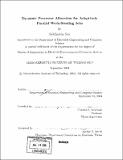Dynamic processor allocation for adaptively parallel work-stealing jobs
Author(s)
Sen, Siddhartha, 1981-
DownloadFull printable version (6.467Mb)
Other Contributors
Massachusetts Institute of Technology. Dept. of Electrical Engineering and Computer Science.
Advisor
Charles E. Leiserson.
Terms of use
Metadata
Show full item recordAbstract
TCP's burstiness is usually regarded as harmful, or at best, inconvenient. Instead, this thesis suggests a new perspective and examines whether TCP's burstiness is useful for certain applications. It claims that burstiness can be harnessed to insulate traffic from packet reordering caused by route change. We introduce the use of flowlets, a new abstraction for a burst of packets from a particular flow followed by an idle interval. We apply flowlets to the routing of traffic along multiple paths and develop a scheme using flowlet-switching to split traffic across multiple parallel paths. Flowlet switching is an ideal technique for load balancing traffic across multiple paths as it achieves the accuracy of packet-switching and the robustness to packet reordering of flow-switching. This research evaluates the accuracy, simplicity, overhead and robustness to reordering flowlet switching entails. Using a combination of trace analysis and network simulation, we demonstrate the feasibility of implementing flowlet-based switching.
Description
Thesis (M. Eng.)--Massachusetts Institute of Technology, Dept. of Electrical Engineering and Computer Science, 2004. Includes bibliographical references (p. 77-82).
Date issued
2004Department
Massachusetts Institute of Technology. Department of Electrical Engineering and Computer SciencePublisher
Massachusetts Institute of Technology
Keywords
Electrical Engineering and Computer Science.